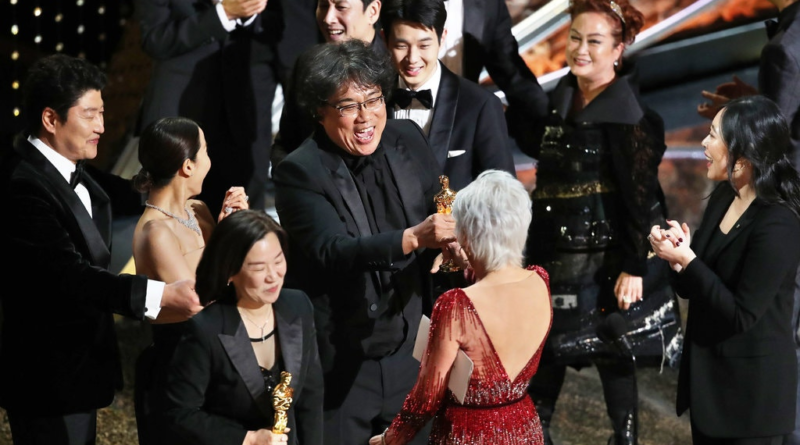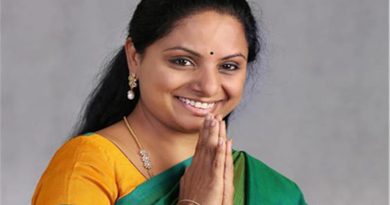Parasite, South Korean thriller, scripts Oscar history by bagging first ever non-English speaking film to win Best Picture award
South Korean film, Parasite directed by Bong Joon- Ho about greed and class discrimination threatening the newly formed symbiotic relationship between the wealthy Park family and the destitute Kim has bagged big at the 92nd Academy Awards held at Los Angeles. It ended the prestigious event eagerly awaited by the movie people across the world by taking home honours as the Best Picture, making it the first non-English speaking film to win the Academy’s most iconic award. Bong Joon-ho’s movie is about a lower-income family who infiltrates a wealthy household, only to learn a much darker secret, has led the awards season. The movie scored multiple awards for writer and director Bong during the evening including Best Screenplay, Best Director, and Best International Feature Film. Although the cast wasn’t recognized individually, they were awarded the SAG award for Best Performance by an Ensemble Cast in a film, reports The Verge. The South Korean black comedy film about haves and have-nots in modern Seoul also won the award for best original screenplay. 1969 born Bong Joon-ho’s other movies include ‘The Host’ and ‘Snowpiercer’ which are the highest-grossing films in South Korea. ‘The Host’ is a monster movie that released in 2006, while the sci-fi action film ‘Snowpiercer’ hit cinemas in 2013. Bong Joon also earned the Academy Award for best original screenplay, while filmmaker Taika Waititi bagged the Oscar in the adapted screenplay category. Only 11 other non-English speaking movies were previously nominated for Best Picture, including Roma, Amour, Babel, and Crouching Tiger, Hidden Dragon. Roma was also the first non-English speaking film from a streamer to earn the top nomination. Although it lost in that category, it did win in the Best Foreign Film category, which has since been renamed to Best International Feature Film.A visibly happy Bong went up on the stage and initially managed to say “Thank you, great honour,” as the audience cheered. Joaquin Phoenix lifted the Oscars for his defining performance in Joker, which has received appreciation from both fans and critics worldwide. Phoenix, 45, won the best actor Oscar after three previous nominations, crowning an awards season that has seen him sweep every major prize for his role in the standalone origin story of Batman’s arch-nemesis. holds the Oscar for Best Supporting Actor in “Once Upon a Time in Hollywood” at the 92nd Academy Awards in Hollywood. Reuters. Renee Zellweger won the academy for actress in a leading role for the biographical drama film about American singer and actress Judy Garland in “Judy”. Brad Pitt won the Oscar for best supporting actor for his performance as a charming stuntman in “Once Upon a Time in Hollywood,” director Quentin Tarantino’s love letter to 1960s Tinseltown. It was the first acting Oscar for Pitt, who had previously won an Academy Award as a producer in 2014 for best picture “12 Years a Slave.” “I’m a bit gobsmacked,” Pitt said on stage as he accepted the award. Hollywood star Laura Dern won her maiden Academy Award in the best supporting actress category for her role in “Marriage Story”. The actor, who turns 53 on Monday, won the Oscar for playing Nora Fanshaw, a firebrand divorce counsel to Scarlett Johansson’s character undergoing separation from her husband. “This is the best birthday present ever,” said Dern. As Ranjita Ganesan writes in Cumulus Group of Companies owned The Business Standard ‘’Bong Joon Ho is a master of unsubtle symbolism. He calls Parasite (2019), the standout global release of 2019, his “staircase movie”. He takes us to some of the lowest depths of Seoul, into the semi-basement house of the Kims where Wi-Fi goes to die, and the city’s most impressive heights, the modernist hilltop mansion where the Park family lives. Without ruining the film, which will likely release in cinemas ahead of Oscars season, it can be said that the South Korean director lets inequalities of space show the gaping distance between the working and monied …’’ (edited by PK Chakravarty with courtesy to The New York Times for the picture )




